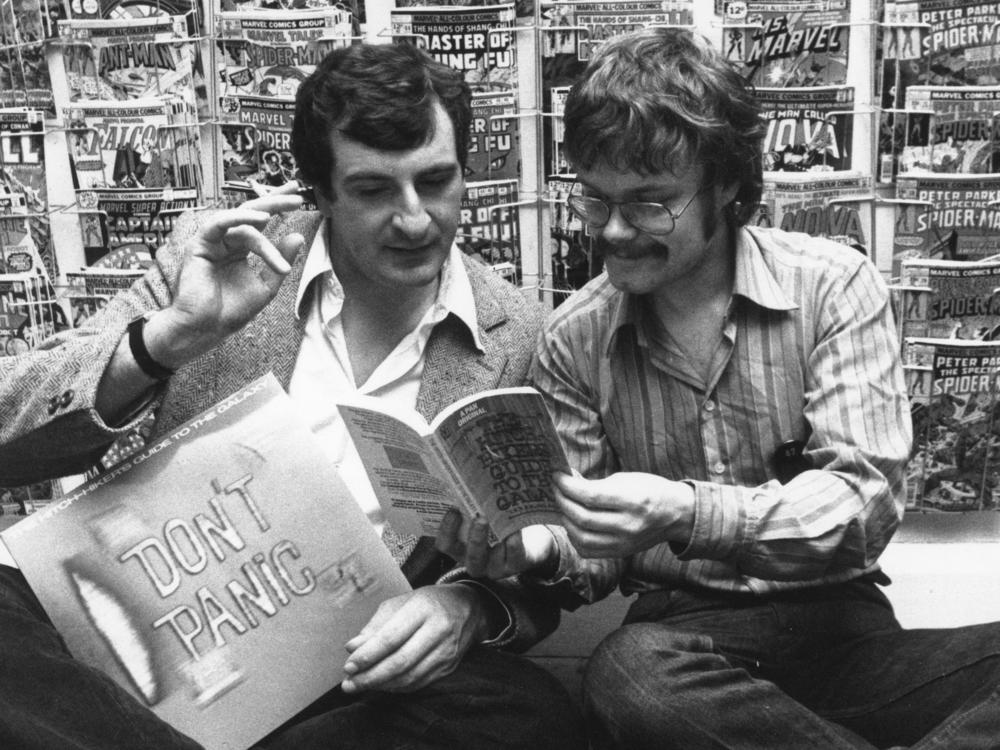Section Branding
Header Content
It's been 42 years since 'The Hitchhiker's Guide' answered the ultimate question
Primary Content
It's the answer to the ultimate question of life, the universe and everything: 42.
And 42 is now the number of years since the publication of The Hitchhiker's Guide To The Galaxy, the first in the series of wacky and beloved sci-fi books by Douglas Adams.
The book follows Englishman Arthur Dent as he wakes up to find that Earth is about to be demolished to make way for a space highway. Adventure ensues across the galaxy with aliens, super computers and Marvin, a perpetually sad robot.
The iconic sci-fi franchise has taken on many forms, including a TV show, a movie, live theater productions, a computer game and comic books. It started as a BBC radio series in 1978.
But it's most well-known as a book, first published in October 1979. And after 42 years, fans still find joy in the humorous characters, absurd plots and subtle lessons that have kept the cultural legacy strong.
Shamini Bundell, a science video journalist at Nature.org, says her obsession with The Hitchhiker's Guide began early.
"I'm a massive sci-fi fan, and a bit of a geek," Bundell tells Weekend Edition. "I remember in particular at one point getting the entire original radio series, and would listen to it before bed each night on my little CD player next to a bed."
Bundell said the story is a satire on what happens around the world and what we're doing to our planet and is still relevant today.
In the story, Vogons are an alien race destroying planets to make way for construction of a new hyperspace bypass.
"There's a lot of jokes in the Hitchhiker's book about sort of bureaucracy, the Vogons being sort of the epitome of they won't do anything without forms signed in triplicate," she says.
It reminds Bundell of how world leaders handle major issues, such as climate change, where they gather and say "we should definitely do something about climate change. But in practice, the years go by ... and we don't."
While the series can parody life on a larger scale, it's also moved fans on a personal level.
For Amit Oz, a chef in Hong Kong, the book helped him when he moved from Israel to China when he was young.
"The fact that life is just an adventure and the goal is to have fun. You're there to make the most of what's around you and be a good person while you do it," Oz says. "And I think that's grounding when your world is becoming an adventure."
The chef's favorite part of the Hitchhiker's series is Milliways, the restaurant at the end of the universe where visitors can witness the reverse Big Bang as they enjoy a meal. The familiarity of food and dining in the books resonates with him.
"It's funny because aliens from everywhere are coming in to do something that is very human, which is sit around and eat," he says.
"If you are hitchhiking around the universe and you can sit down in a spaceship or on another planet and have some noodles with a friend, a new friend or an old friend, it suddenly doesn't feel that distant or that far away or scary anymore."
The influence of the Hitchhiker's Guide "is everywhere," says Marcus O'Dair, author of The Rough Guide to the Hitchhiker's Guide to the Galaxy.
"We can see it in culture, where Adams' story is rumoured to have inspired everything from the band Level 42 to comedy show The Kumars at No. 42," he says. "We can see it in tech: in the real-life 'knife that toasts,' for instance, or in-ear translation services reminiscent of the Babel fish. The most visible sign of its ubiquity, though, might be the fact that we can celebrate its anniversary not at 40 or 50 years but at 42 — and everyone knows why."
So no matter how you choose to celebrate, remember to bring your towel.
Copyright 2021 NPR. To see more, visit https://www.npr.org.

